Coronavirus Update: 6 Deaths and 234 New Cases in Croatia in Past 24 Hours
ZAGREB, September 18, 2020 - Six people have died in Croatia in the past 24 hours as a consequence of the coronavirus and 234 new cases have been identified, bringing the total number of active cases to 2,100, the national Covid response team reported on Friday.
Currently, 280 patients are being treated for the new virus in hospitals, 21 of whom are on ventilators.
Since 25 February, when the first case of the disease was registered in Croatia, a total of 14,513 people have been infected with Covid-19 and 244 of them have died, while 12,169 have recovered, including 236 in the past 24 hours.
There are currently 8,938 people in self-isolation. A total of 249,023 people have been tested for the virus to date, including 6,137 in the past 24 hours.
For the latest travel info, bookmark our main travel info article, which is updated daily.
Read the Croatian Travel Update in your language - now available in 24 languages!
Official Recommendations, Instructions for Crossing the Croatian Border
September 18, 2020 - The official koronavirus.hr website has published updated recommendations and instructions for crossing the Croatian border.
Recommendations and instructions of the Croatian Institute of public Health for passengers crossing the state border of the Republic of Croatia.
Important note: Valid till 30th of September
The Decision on temporary prohibition of crossing the border crossings of the Republic of Croatia (NN 74/20) prohibits or restricts the crossing of passengers through border crossings, of which are exempt:
- EU nationals (irrespective of their place of residence), the Schengen area and Schengen associated countries, as well as members of their families and third-country nationals who are long-term residents under Council Directive 2003/109/EZ of 25 November 2003 on the status of long-term nationals of third countries and persons entitled to stay under other EU or national Directives or having national long-term visas.
- The temporary prohibition on entry into the Republic of Croatia from third countries, with the exception of passengers referred to in point 1, shall not apply to:
2a) Health care professionals, health researchers and associates, nursing professionals and persons requiring urgent medical treatment
2b) Cross-border workers
2c) Carriers of goods and other transport personnel to the extent necessary
2d) Diplomats, police officers in the performance of their duties, civil protection services and teams, staff of international organisations and international military personnel in the performance of their functions
2e) Transit passengers
2f) Passengers travelling for tourism or other business reasons or having other economic interest, and passengers travelling for the purpose of education
2g) Passengers travelling for urgent personal reasons (e.g. they own a property in the Republic of Croatia) or have any other immediate personal reason
Instructions for the health supervision of passengers entering the Republic of Croatia from third countries:
a) For all passengers entering the Republic of Croatia from third countries, under exemption from the prohibition to cross the border referred to in point 2g, health supervision with 14 days quarantine/self-isolation is mandatory.
Quarantine/self-isolation can be shortened to seven days if a passenger does a nasal and pharynx swab at his/her expense seven days after entering Croatia and gets a negative PCR test result for SARS-CoV-2.
b) The obligation of self-isolation for passengers entering the Republic of Croatia from third countries does not apply to passengers referred to in points 2a, 2b, 2c, 2d, and:
2e) Transit passengers:
- For transit passengers, the border police will, after they have been granted entry, check whether they have left the territory of the Republic of Croatia within 12 hours
- This rule can only be applied if the departure from the Republic of Croatia to a neighbouring country enables it to enter.
2f) – Passengers entering the Republic of Croatia for tourism or other business reasons or having other economic interest, as well as persons travelling for educational purposes.
These passengers may enter Croatia without the obligation of self-isolation upon presentation of a negative nasal and pharynx swab test for SARS-CoV-2, not older than 48 hours (starting from the time of taking the swab until arrival at the border crossing), or with the obligation of 14 days quarantine/self-isolation if they do not have a negative PCR test.
If third-country nationals have a test older than 48 hours when entering Croatia, they will be allowed to enter Croatia, however, they will be obligated to self-isolate and re-test themselves in Croatia at their own expense. The above can be applied to passengers and crew members on yachts. Persons who do not present a negative PCR result are subject to a mandatory 14-day quarantine / self-isolation measure.
Persons who have a negative PCR test, and are on the self-isolation list, whether they’ve been on the list for seven days, as stated in point 2g, or have re-tested themselves in the case they have a test older than 48 hours when entering Croatia, are to be removed from the self-isolation list.
Passengers entering Croatia without the obligation of self-isolation shall comply with the following measures during the first two weeks of their stay in Croatia:
- During the first 14 days after entering the Republic of Croatia, exits from accommodation are limited only to the necessary ones: performance of work if it is a business reason for entering the Republic of Croatia, performance of necessary activities with continuous intensified implementation of hygiene measures.
- During the necessary exit from accommodation it is recommended to use a mask or covers for the nose and mouth, maintain physical distance from other persons (minimum 1.5 meters) and conduct hand hygiene.
- Hands wash as often as possible with warm water and soap and/or use a hand disinfectant that needs to be rubbed in the palms. Avoid touching the face, mouth, nose and eyes.
- Avoid the use of public transport. In a means of transport, it is desirable that a person is alone or exclusively with persons sharing a common accommodation.
- Gatherings should be consistently avoided
- During business meetings it is necessary to meet as few people as possible, ensure a physical distance of 1.5 meters and availability of disinfectants, and avoid unnecessary meetings.
- Payment services are performed by non-cash card payments or on-line services.
- Every morning it is necessary to measure the body temperature if it is higher than 37.2C, the measurement should be repeated after 10 minutes, and if the temperature is higher than 37.2 C it is necessary to stay at home/in accommodation and contact a doctor in a tourist or COVID-19 infirmary or a territorially responsible epidemiologist.
- In case of symptoms of acute respiratory infection (cough, sore throat, fever, short breathing/difficulty or loss of smell), it is necessary to stay at home/in accommodation and contact a doctor in a tourist or A COVID-19 infirmary or a territorially responsible epidemiologist.
- In case of sudden onset of severe, life-threatening symptoms, contact emergency medical service at 194.
For the latest travel info, bookmark our main travel info article, which is updated daily.
Read the Croatian Travel Update in your language - now available in 24 languages!
Official COVID-19 in Croatia Weekly Report September 8-14
September 18, 2020 - The latest official COVID-19 in Croatia weekly report has been released by the Koronavirus government website, covering September 8-14.
CIPH report for the previous 7 days and daily report for the Republic of Croatia on the 14th of September 2020.
| Confirmed cases 13 598 | Recovered 11 151 | Deaths 227 | Active cases 2 220 |
| Tested 225 014 | Hospitalized 310 | On a respirator 22 | Self-isolation 8 217 |
| A total of 120 people died in this epidemic wave. Most of the deceased had significant comorbidities or were of advanced age. The average age of the deceased in this epidemic wave is 76.7 years. Forty-eight people died on a respirator. | |||
There are currently 22 testing places in the Republic of Croatia that perform RT-PCR analysis and collect samples. All processed samples enter national Croatian Health Insurance Institute platform, which is accessible to all county public health institutes. County public health institutes submit data about positive cases, sources of infection and hotspots as part of their daily reports to the Croatian Institute of Public Health. The Croatian Institute of Public Health collects information about hotspots, hospital treatment of COVID-19 positive persons, COVID-19 positive patients on respirators and the deceased. You can find more about the test centers available at the link.
Epidemiological indicators on 14 th of September:
Cumulative 7-day incidence rate for the Republic of Croatia: 37,1/100 000
- Cumulative 14-day incidence rate for the Republic of Croatia: 81,4/100 000
- Counties with a cumulative 7-day incidence rate greater than 50/100 000 inhabitants: Brodsko-posavska, Dubrovačko-neretvanska, Požeško-slavonska, Splitsko-dalmatinska, Virovitičko-podravska, Zadarska
- Counties with a cumulative 14- day incidence rate greater than 100/100 000 inhabitants: Dubrovačko-neretvanska, Požeško-slavonska, Splitsko-dalmatinska, Šibensko-kninska, Virovitičko-podravska, Zadarska
- Total number of tests in the last week: 31 861
- Share of positive tests in the total number of tests in the last week: 4,8 %
- Total number of tests and share of positive tests in total number of tests: 225 014, 6,04 %
- The number of new cases in intensive care per 100,000 inhabitants in the last 7 days: 0,4/100 000
- Number of deaths in the last week: 26
- Total death rate per 1 000 000 population: 55,5/1 000 000
Epidemiological situation in Croatia
In a two-week period from 1st of September to 14th of September all counties recorded new cases of COVID-19 disease. The highest number of new cases are recorded in the Splitsko - dalmatinska County, followed by the City of Zagreb and Dubrovačko-neretvanska County. The lowest number of new cases were recorded in Međimurska and Varaždinska County. The Splitsko - dalmatinska County also has the highest 14-day rate, followed by Dubrovačko-neretvanska and Požeško-slavonska County.
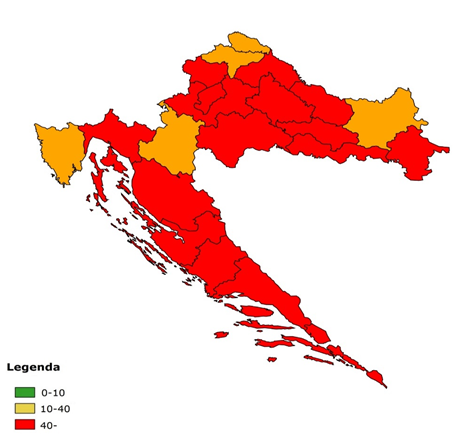
| CITY OF ZAGREB | 76,1 |
| BBC | 93,6 |
| BPC | 97,8 |
| DNC | 184,8 |
| ISTARSKA C. | 32,6 |
| KARLOVAČKA C. | 37,7 |
| KKC | 50,1 |
| KZC | 42,3 |
| LSC | 97,4 |
| MEĐIMURSKA C. | 21,8 |
| OBC | 33,5 |
| PSC | 147,4 |
| PGC | 57,3 |
| SMC | 43,1 |
| SDC | 195,3 |
| ŠKC | 104,8 |
| VARAŽDINSKA C. | 25,2 |
| VPC | 107,6 |
| VSC | 53,8 |
| ZADARSKA C. | 117,7 |
| ZAGREBAČKA C. | 53,0 |
| TOTAL | 81,4 |
Figure 1. 14-day rate by counties
Epidemic by weeks, from 19 th – 29 th week of the epidemic
In the period from 29 th of June to 13th of September 2020, the number of cases per week (from the 19 th to the 29th week of the epidemic) was from 460 to 1,948 and the rate from 11.3 to 47.6 per 100,000 inhabitants. The number of tests performed per week was ranged from 7,957 to 24,722 and the share of positive tests in those tested per week ranged from 4.3 to 12.5%. During this period, the weekly number of cases and the percentage of positive tests in the weekly number of tested varied. An overview is given in Table 1.
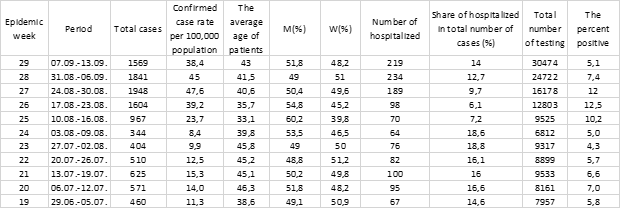
Table 1. Overview of the number of confirmed cases by weeks, from week 19 th – 29 th
In the period from 29 th of June to 14th of September 2020, the number of cases per week (from the 19 th to the 29th week of the epidemic) was from 460 to 1948. The number of deceased varied from 1-16 and showed increase in the 29th week of the epidemic. The share of deceased on the respirator ranged in the weekly number of deaths from 16.7-60%. The mean age of deceased was 75 years or more, except in the 21 st week of the epidemic, when the mean age of death cases was 72,7 years.
The death rate ranged from 0.1 in the 19 th week of the epidemic to 0.3 in the 23rd and 28 th week of the epidemic with an increase in the 29 th week of the epidemic when it was 0.6. An overview is given in Table 2.

Table 2. Overview of patients on respirator and deaths by weeks, from week 19 th – 29 th
Table 3 shows the incidence of the 7-day rate in the two last weeks with a limit of 50/100 000 inhabitants, which in some countries is taken as one of the criteria in assessing the epidemiological situation. In most counties, the 7-day rate is generally stable or slightly declining.
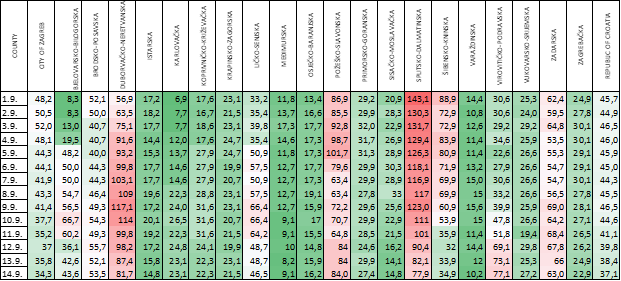
Table 3. Overview of 7-day incidence rates per 100,000 population in the last week
Clinical aspects - hospitalized, on a respirator and recovered in the last week
Figure 2 shows the relationship between the daily number of confirmed cases and the daily number of hospitalized cases. Number of hospitalized cases per day ranged between a minimum of 17 and a maximum of 42, while the share of hospitalized cases in the total daily number of confirmed cases ranged from 9.7% to 26.2%.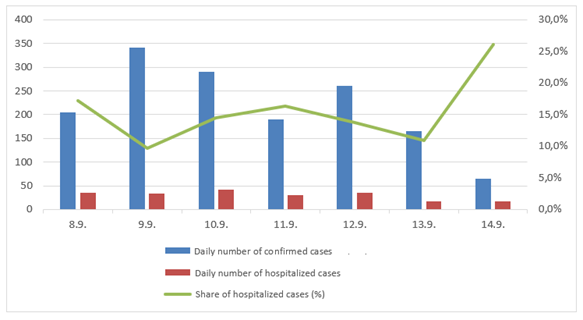
Figure 2. Overview of the daily number of confirmed and hospitalized cases (8.9.-14.9.)
Figure 3 shows the proportion of hospitalized in the total number of weekly cases. In the last week, 230 people were hospitalized, which is 14% of the total number of patients in the given period. In the same period, 16 people were put on a respirator, which makes 1,1% of the total number of confirmed cases.
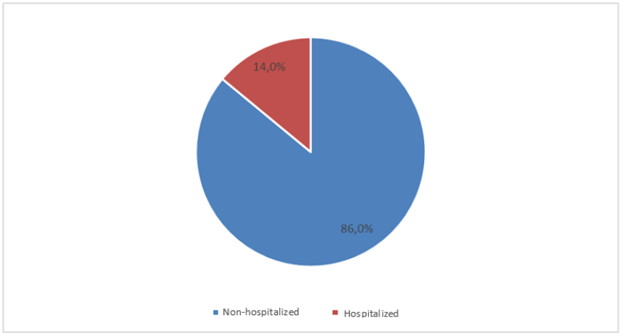
Figure 3. Relation of the total number of confirmed and hospitalized cases (8.9.-14.9.)
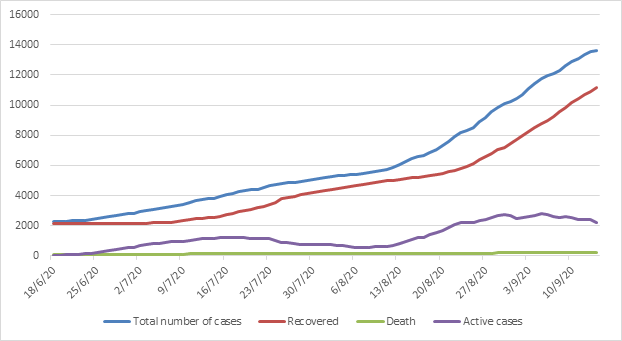
Figure 4. Total number of cases, recovered, deceased and active number of cases from 18.6.- 14.9.
Died from COVID-19, 8 th of September – 14 th of September 2020, age and sex
A total of 120 people died in this wave of epidemics. Most of the people who died had significant comorbidities or were of advanced age. The mean age of the deceased in this wave of epidemics is 76.4 years. Forty-eight people died on a respirator.
An overview of the situation is given in Table 4 and Figure 5.
| AGE GROUP | 40-49 | 50-59 | 60-69 | 70-79 | 80-89 | 90-99 | 100+ |
| MEN | 1 | 7 | 15 | 30 | 17 | 4 | 0 |
| WOMEN | 0 | 0 | 6 | 9 | 25 | 5 | 1 |
Table 4. Distribution by age and sex of the deceased persons
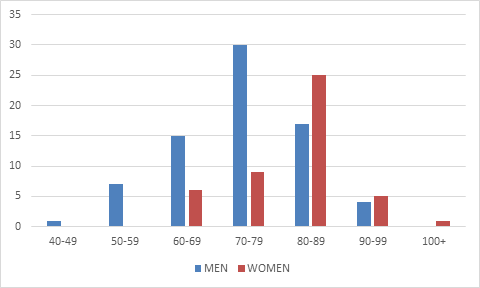
Figure 5. Age and sex distribution of deaths from COVID-19 in the period 29 th June – 14th of September 2020
In the last week, 26 people died, of which 10 (38.5%) were on a respirator. The distribution by age and sex in the last weeks is shown in Table 5, and by counties in Table 6.
| AGE GROUP | 40-49 | 50-59 | 60-69 | 70-79 | 80-89 | 90-99 |
| MEN | 1 | 2 | 1 | 6 | 6 | 3 |
| WOMEN | 0 | 0 | 2 | 2 | 3 | 0 |
Table 5. Distribution by age and sex of the deceased people in the last week
Hotspots
In the last week, new cases were recorded in all counties of continental Croatia, but mostly in the City of Zagreb, Brodsko - posavska and Zagrebačka County. The highest 7-day rates on 14 th of September were in Požeško - slavonska, Virovitičko - podravska and Brodsko – posavska County. There is still influx of patients whose source of infection is associated with holidays on the Adriatic, but their share is significantly reducing. The number of wedding celebrations at which patients were registered increased, but at most there was no large spread among the guests. A larger influx of patients was recorded at wedding celebrations in Brodsko - posavska, Varaždinska, Bjelovarsko - bilogorska and Vukovarsko - srijemska Counties. In Požeško - slavonska County, patients are recorded in connection with the prom dinner and the sacral event. In the City of Zagreb, a grouping of patients was recorded in connection with an organized event in the Splitsko - dalmatinska County. The grouping of patients was recorded in health care institutions in the City of Zagreb, Brodsko - posavska and Virovitičko - podravska Counties and institutions for social care in Sisačko - moslavačka County. Cases of the disease have also occurred in schools, but there has been no significant spread among students and staff. Part of the sick people are cases imported from abroad and there is a large proportion of contacts of sick people.
Coastal Croatia
Cases of ill persons have been recorded in Coastal Croatia like in all counties as well. The highest number of patients was recorded in the Splitsko - dalmatinska, Dubrovačko - neretvanska and Zadarska County. The highest 7-day rate is in the Splitsko - dalmatinska, Dubrovačko - neretvanska and Zadarska County. In the Splitsko - dalmatinska County, smaller groupings were recorded in two monasteries. In the Primorsko - goranska County, a significant number of patients was recorded this week as well, related to an organized cultural event in the open air and a smaller grouping of patients was also recorded in the preschool institution in the Istria County. In Zadarska County, there are two kindergartens in self-isolation and a class in one school building. Groupings of patients were also recorded at the workplace in Dubrovačko - neretvanska County and Šibensko - kninska County. The patients were also recorded in a home for the elderly in Ličko – senjska County. There were patients from wedding celebrations in Zadarska County and Ličko – senjska County, as well as in the continental part of Croatia. Although sick people have appeared at multiple weddings, there wasn’t a great spreading among guests. A significant proportion of patients are contacts of previously recorded cases.
Age-sex distribution of patients in the last week
In the previous week, a total of 1,517 people fell ill - approximately the same number of males, 732 (48.3%) and females, 785 (51.7%). The same distribution by sex is present in most age groups, except in the age group 1-6 years where twice as many girls were recorded and in the age group 41-50 years of age where more women became ill than men.
By age groups - 160 children fell ill and they make the smallest share (10.5%) in the ill people in the past week. The least affected were children under 1 year of age, a total of 2, and children in lower grades of primary school, a total of 15. The most affected were children of secondary school age, a total of 33. In general, adults made the largest share in the total number of patients last week 1142 (75,3 %).
In contrast to previous weeks, there is a shift in the age of patients towards higher age groups. The largest share, 21.9% (332 cases) are people aged 51-65, while a one - fifth of patients (145 or 18.9%) in the last week are young adults aged 19 to 30 years. The lowest number of patients in the age group is 66 and older (215 or 14.2%), although this number is not negligible because it is in this group of patients that the highest number of concomitant comorbidities is observed, which are associated with increased risk in COVID-19 from the development of a more severe clinical picture.
The full view can be found in Figure 6 and Table 6.
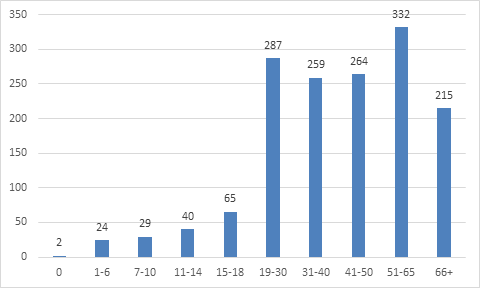
Figure 6. Distribution of patients in the last week by age groups
Measures
Measures to maintain physical distance, maintain hand hygiene and disinfection are still in force. Also, it is mandatory to wear face masks or medical masks indoors for all health workers and professionals, employees who work in social care system and the ones who work in hospitality facilities
Decisions of the Headquarters
- September 8 - Decision about amendments to the Decision about the introduction of necessary epidemiological measures for the Brodsko - posavska County
- September 8 - Decision about the introduction of new epidemiological measures for the area of the City of Otočac
- September 9 - Decision about amendments to the Decision about the introduction of necessary epidemiological measures for the area of Zadarska County
- September 9 - Decision amending the Decision about the introduction of necessary epidemiological measures for the area of Splitsko - dalmatinska County
- September 11 - Decision amending the Decision about the introduction of necessary epidemiological measures for the area of Dubrovačko - neretvanska County
- September 11 - Decision about the introduction of necessary epidemiological measures for the area of Virovitičko - podravska County
- September 11 - Decision about the introduction of necessary epidemiological measures for the Zagrebačka County
CIPH recommendations
- Recommendations for the prevention of COVID-19 infection in the activity of multiplex cinemas in shopping malls
- Instructions for the implementation of the state matriculation exam during the coronavirus epidemic (COVID-19) autumn deadline - August and September 2020
- Supplement to the recommendation for the prevention of COVID-19 infection in the catering industry of nightclubs
- Possibilities of conducting extracurricular classes related to the COVID-19 pandemic
- Instructions for prevention and suppression of the COVID-19 epidemic related to the work of preschool institutions, primary and secondary schools in the school year 2020/2021.
- Recommendations for manufacturers of textile masks intended for schools
- Guidelines for the prevention and control of the COVID-19 epidemic in student dormitories with regard to the COVID-19 epidemic in the school year 2020/2021.
- Recommendations for the operation of dance schools during the coronavirus epidemic (COVID-19)
- Recommendations for the operation of art schools during the coronavirus epidemic (COVID-19)
- Priorities for testing for SARS-CoV-2, on contact handling, completion of isolation and self-isolation (Consolidated revised recommendations)
- Diseases and health conditions that may increase the risk for more severe forms of COVID-19 disease
- Selected health and organizational issues related to the work of preschool institutions, primary and secondary schools in the school year 2020/2021
- Recommendations for teaching at higher education institutions in the period of the COVID-19 pandemic with the application of anti-epidemic measures
- Organization of rest and food - Work of preschool institutions, primary and secondary schools in the school year 2020/2021 - additional clarifications
- Visors cannot replace masks except when a student / person has a problem with hearing impairment - Work of preschool institutions, primary and secondary schools in the school year 2020/2021 - additional clarifications
Recommendations and measures on global and EU level
Europe
On 10th of August 2020, ECDC released an updated version of the risk assessment. ECDC has additional documents and information available:
The number of cases and the 7-day cumulative incidence of COVID-19 confirmed cases worldwide can be found on the ECDC dashboard:
https://qap.ecdc.europa.eu/public/extensions/COVID-19/COVID-19.html
Austria
Bundesministerium für Soziales, Gesundheit, Pflege und Konsumentenschutz - https://www.sozialministerium.at/Informationen-zum-Coronavirus/Neuartiges-Coronavirus-(2019-nCov).html
Netherlands
Government of the Netherlands - https://www.government.nl/topics/coronavirus-covid-19
National Institute for Public Health and the Environment - https://www.rivm.nl/en/novel-coronavirus-covid-19
Germany
Rober Koch Institut - https://www.rki.de/DE/Home/homepage_node.html
Slovenia
(gov.si) - https://www.gov.si/en/topics/coronavirus-disease-covid-19/
National Institute for Public Health – Slovenia - https://www.nijz.si/en
United Kingdom
gov.uk – https://www.gov.uk/coronavirus
NHS - https://www.nhs.uk/conditions/coronavirus-covid-19/
World
WHO provides comprehensive information and documents. WHO COVID-19-Dashboard:
Coronavirus disease (COVID-19) Weekly Epidemiological Update and Weekly Operational Update i Weekly Surveillance Report:
- https://www.who.int/emergencies/diseases/novel-coronavirus-2019/situation-reports
- https://www.euro.who.int/en/health-topics/health-emergencies/coronavirus-covid-19/weekly-surveillance-report
Sources of information
https://www.hzjz.hr/
https://zdravlje.gov.hr/
Information about the global epidemiological situation
More about COVID-19 in other countries can be found and learned on the ECDC website: https://www.ecdc.europa.eu/en/geographical-distribution-2019-ncov-cases
The WHO Regional Office for Europe, the European Commission and the European Observatory on Health Systems and Health Policy have at their disposal the COVID-19 Health System Response Monitor (HSRM). There is information available about European countries and ways to respond to this epidemic. The focus is on health systems and public initiatives: https://www.covid19healthsystem.org/mainpage.aspx
For the latest travel info, bookmark our main travel info article, which is updated daily.
Read the Croatian Travel Update in your language - now available in 24 languages!
Croatian Bishops Warn against Conspiracy Theories, False Rumours about COVID
ZAGREB, Sept 17, 2020 - The Iustitia et Pax Commission of the Croatian Catholic Bishops' Conference (HBK) said on Thursday that the general public had the right to know about decisions made by the authorities, however, disseminating conspiracy theories and negating one's own responsibility was unacceptable.
"Pope Francis has underlined in his speeches on several occasions that the experience of the (COVID-19) pandemic has shown us that no one can be saved alone." the Commission says in its statement on the topic of the outbreak of the novel coronavirus and actions taken to curb it.
The Commission points out the importance of solidarity and brotherhood in these times.
The epidemic of coronavirus has raised many ethical and legal issues, and it is evident that some extraordinary measures imposed by countries for the sake of the protection of public health have restricted human rights.
However, those restricted rights are not absolute, and therefore the states can restrict them for the protection of some other rights.
Croatian bishops say that it obvious that the protection of public health is above the unlimitedness of freedoms and some other rights of individuals, and in this context, they quote the European Convention on Human Rights.
The bishops find the position of the Croatian Constitutional Court on the matter very important in the context of the further activities of the relevant authorities and recall that the Court has confirmed the fact that legal regulations define the boundaries of the ethical and legal responsibility of citizens.
The bishops call for public support for the work and dignity of the Croatian national COVID-19 crisis management team and of all workers in the healthcare system.
"Disseminating conspiracy theories and panic as well as ignoring one's own responsibility and neglecting the rights of others as well as ignoring the scientific knowledge and the obvious reality is unacceptable because it only creates havoc, which we do not need at all," the bishops say, calling on every individual to behave responsibly.
For the latest travel info, bookmark our main travel info article, which is updated daily.
Read the Croatian Travel Update in your language - now available in 24 languages
Croatia Reports 250 New COVID Cases and 2,108 Active Cases
ZAGREB, Sept 17, 2020 - In the last 24 hours, of 5,948 tests performed for coronavirus in Croatia, 250 have returned positive, and the number of active cases stands at 2,108, the national COVID-19 response team said on Thursday.
There have been two more fatalities, bringing the COVID-related death toll to 238.
Currently, 300 infected patients are receiving hospital treatment, and of the 24 are placed on ventilators.
Since February 25, when the first case of the disease was reported in Croatia, 14,279 people have contracted the disease and 11,933 of them have recovered.
The team reported that 8,756 people were now self-isolating.
Since the outbreak of this infectious disease, 242,886 tests have been performed.
For the latest travel info, bookmark our main travel info article, which is updated daily.
Read the Croatian Travel Update in your language - now available in 24 languages
Croatian Banks End Coronavirus Measures, No More Debt Freezing
September the 17th, 2020 - The coronavirus pandemic might still be taking the world by storm, with a predicted rise in the number of serious cases in the upcoming colder months as the virus crosses paths with flu season, but not everyone is keeping their coronavirus measures in place. Croatian banks are one of those institutions set to scrap any special benefits garnered as a result of the pandemic,
As Poslovni Dnevnik writes on the 15th of September, 2020, Croatian banks will no longer freeze debts as they chose to do during the pandemic, and the deficits in citizens' accounts will be determined according to the last three months, depending on their employment status, the amount of their income and the regularity of their repayments.
Croatian banks are, as such, abolishing the popular measures they introduced in an attempt to soften the already dire financial blow caused by the spread of the new coronavirus.
The deadline for debt repayment and the amount of overdraft depends on the policy of each individual bank. Thus, some announced changes to their permitted overdrafts for as early as October, with the possibility of payments made in installments.
Some Croatian banks are starting with changes as of next year.
"In accordance with the General Terms and Conditions, as of September the 7th, 2020, clients will be notified of the announcement of the updates of the amount of the overdraft they're permitted to have, which will be performed on October the 10th, 2020," OTP banka said in regard to the overdraft.
"If the reduction in income is what is bothering people, then the solution can be found in extending the loan repayment period, which causes a reduction in the monthly loan obligation. And, the possibilities of easier repayment, which is in line with their new level of income,'' said Dario Gabric from Erste Bank for RTL.
Addiko Bank will start making changes next year.
"At the beginning of November 2020, we'll inform clients about the new amounts of their overdrafts on their current accounts, which will be available from the 1st of January, 2021," read a statement from Addiko Bank.
For the latest travel info, bookmark our main travel info article, which is updated daily.
Read the Croatian Travel Update in your language - now available in 24 languages
Istria Appeals to Austria, Slovenia to Introduce Selective Measures for Croatia
ZAGREB, Sept 16, 2020 - Croatia's Istria County and all the towns in it on Wednesday appealed to Austrian Chancellor Sebastian Kurz and Slovenian Prime Minister Janez Jansa to reconsider the possibility of introducing selective measures for Croatia, on a region to region basis, given the very good epidemiological situation in Istria.
Late last month, Austria and Slovenia put Croatia on their respective red lists of epidemiologically unsafe countries in light of the global coronavirus pandemic.
"Since the outbreak of the COVID-19 epidemic, Istria County has responded promptly and was the first region in Croatia to impose restrictions. The timely, resolute and responsible actions by the Istria County COVID-19 Response Team and the great discipline demonstrated by our citizens, visitors, and businesses in observing the measures adopted have ensured us a continually good and very stable epidemiological situation," the county prefect and mayors said in their appeal to the Austrian chancellor.
They added that Istria County and all the towns in it welcomed the efforts by the Croatian government to reach an agreement with the neighbours and EU member states on introducing an epidemiological regime at the level of Croatian counties and not the country as a whole.
"We are confident that the opening of Istria to citizens of Austria will be welcomed not only by Istria and Croatia but also by our friends in Austria," the appeal said.
In an appeal to Slovenian Prime Minister Janez Jansa, the signatories expressed hope that he would take the necessary steps to ensure freedom of movement between Slovenia and Istria given the very good epidemiological situation in Istria.
"The main part of the tourist season is behind us and in that regard, we have shown that with a good strategy we can ensure a safe environment both for the local population and for tourists," they concluded.
For the latest travel info, bookmark our main travel info article, which is updated daily.
Read the Croatian Travel Update in your language - now available in 24 languages
PM Says President Engaging in Activism Against COVID-19 Team
ZAGREB, Sept 16, 2020 - Prime Minister Andrej Plenkovic said in parliament on Wednesday that President Zoran Milanovic was engaging in activism against the national COVID-19 response team.
Commenting on Milanovic's statement that the Constitutional Court got cold feet when it decided that all decisions made by the COVID-19 team were in line with the Constitution, except for a Sunday trading ban, Plenkovic said: "What do you think, do those who voted against have an opposed political agenda, engaging in some sort of activism, while the others acted in line with the law and Constitution, including the judges?".
He then answered affirmatively when asked if he believed that President Milanovic was the activist leading attacks on the COVID-19 team, adding that "a few people have stirred up the debate and this is one of the activist groups that have been identified."
"Everything is clear," he said when asked if the president and the constitutional court judges who voted against the court's decision were connected.
"I have no idea what inspired those judges to vote against... I couldn't care less. You have Article 16 of the Constitution, the law was adopted, the government formed the team, the team made decisions, the coronavirus was defeated in May, we organised elections before the second wave, the tourist season was 50% of the projections, and I find that good," he said.
"Those who say that the Constitutional Court got cold feet, why didn't they address the court themselves," he said, adding that he was referring to Milanovic.
For the latest travel info, bookmark our main travel info article, which is updated daily.
Read the Croatian Travel Update in your language - now available in 24 languages
Croatia Reports 280 New COVID-19 Cases, Six Fatalities
ZAGREB, Sept 16, 2020 - There have been 280 new cases of the coronavirus infection and six fatalities in Croatia in the past 24 hours, while the number of active cases stands at 2,103, the national COVID-19 response team said on Wednesday.
A total of 293 patients are hospitalised, including 20 who are on ventilators.
With the six latest fatalities, the coronavirus death toll has risen to 236.
Currently, 8,505 people are self-isolating.
Since February 25, when the first case of the disease was reported, 14,029 people have contracted the disease and 11,690 of them have recovered.
A total of 236,938 people have been tested to date, including 6,353 in the last 24 hours.
For the latest travel info, bookmark our main travel info article, which is updated daily.
Read the Croatian Travel Update in your language - now available in 24 languages
President Says Court Decision Won't Put End to Discussions About COVID Team's Work
ZAGREB, Sept 16, 2020 - President Zoran Milanovic said on Tuesday that the Constitutional Court got cold feet when deciding about the constitutionality of epidemiological measures adopted by the national COVID-19 response team, noting that its ruling would not put an end to discussions about the team's work.
"(Those measures) suspend certain human rights and they do so for a longer period of time. A very vague and loose legal framework was adopted and the Constitutional Court got cold feet, but that's only human," Milanovic told reporters in a comment on the Constitutional Court's decision that the COVID-19 response team's epidemiological masures are in line with the Constitution.
"The ruling is as it is, there will be problems because of it, in my opinion, it is not wise and in that sense, I take note of it. I cannot go against it, but I will not keep silent and will defend the Constitution and constitutional freedoms the way I understand them," Milanovic told reporters.
The Constitutional Court is a political body, which in the case of the COVID-19 response team has made a political decision, the president said, adding that this was a rule of democracy.
President Milanovic, who is also the Supreme Commander of the Croatian Armed Forces, was answering reporters' questions at Pleso Airport, where he attended a welcome ceremony for the 12th Croatian contingent returning from the Resolute Support mission in Afghanistan.
Milanovic reiterated his position that there was a state of emergency in Croatia, a state of natural disaster, just as in the whole of Europe, and that debates about the constitutionality of decisions made by the team managing the coronavirus crisis would not stop.
He added that a few months ago he had warned that "in the case of the COVID-19 team a house was being built without legal foundations."
He believes that the situation could have been avoided elegantly and one could have avoided "questions about jurisdiction, whether one has the right to issue orders and whether those orders exist or are fiction."
Milanovic believes decisions of the Constitutional Court should be debated because they concern important social topics.
"That is called making the nation literate. People should be able to discuss anything, and if something is unjust, they should be able to oppose it. This is simply fear of criticism," Milanovic said when asked to comment on the view of some HDZ members that decisions by the Constitutional Court should not be debated.
Milanovic, however, does not share the view of some of the opposition parties that the Constitutional Court should be abolished.
"Of course not; but it is a political institution, it is not a regular court. There is no close connection with classic adjudication," he added.
The decision on fighter jets political
Asked about the condition of MiG jets, which at the time of his government's term in office were overhauled in Ukraine, Milanovic said that the jets were in the best possible condition compared to the condition they could be in.
"When their age is taken into account, one can say that they were saved with the overhaul in Ukraine, which cost the state US$ 10 or 15 million. That's an insignificant amount for the state. It was an absolutely good job back then. If we had not done it, we would not have any jets today, but we still have a certain number of jets that fly... it was a necessary move, but it has its shelf life," Milanovic said.
He repeated that now one should buy new planes, that the government was in charge of the process but that he believed the US offer should be given priority for a number of reasons.
"They have just donated us two helicopters. Those are all factors that should be taken into account when making a decision. The government must be as neutral as possible but eventually, the decision is a political one," Milanovic said.


